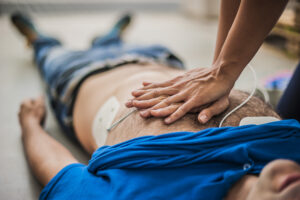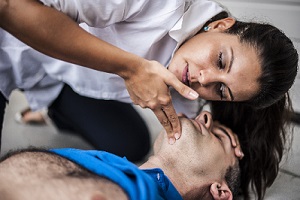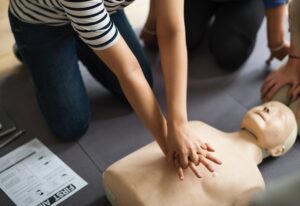Restart a Heart Day takes place on 16th October each year to raise awareness of cardiac arrest and the importance of learning CPR.
 Led by the Resuscitation Council UK and supported by the British Heart Foundation, alongside other national charities, NHS England and the Association of Ambulance Chief Executives, Restart a Heart Day aims to support people to learn CPR and gain the confidence and skills to save a life.
Led by the Resuscitation Council UK and supported by the British Heart Foundation, alongside other national charities, NHS England and the Association of Ambulance Chief Executives, Restart a Heart Day aims to support people to learn CPR and gain the confidence and skills to save a life.
Each year, thousands of people access free online training tools to learn CPR on Restart a Heart Day.
The British Heart Foundation’s RevivR tool trained over 5,000 people in 2024 and, this year, they aim to support even more people to learn CPR. In addition to this, the charity encourages communities which need automated external defibrillators (AEDs or defibrillators) to apply for one for free as part of their community-funded defibrillator programme.
Restart a Heart Day aims to save lives
Both prongs of this campaign are vitally important.
 Each year in the UK alone, around 40,000 people experience an out-of-hospital cardiac arrest. Around 8 in 10 of these occur in the home. Less than 1 in 10 people who experience an out-of-hospital cardiac arrest will survive.
Each year in the UK alone, around 40,000 people experience an out-of-hospital cardiac arrest. Around 8 in 10 of these occur in the home. Less than 1 in 10 people who experience an out-of-hospital cardiac arrest will survive.
Early CPR and defibrillation are key to improving survival rates. If these life-saving measures are in place, patients have more than double the chance of surviving an out-of-hospital cardiac arrest.
But access to defibrillators, and CPR training, is unequal across the UK.
According to the BHF, in the most disadvantaged areas in the country, the nearest 24/7 accessible defibrillator is, on average, located a round trip of over a mile, or 1.8km away. Distances are crucial since, for every minute without CPR and defibrillation, chances of survival drop by up to 10%.
Any organisation that has a defibrillator is urged to make it accessible to the public 24/7 and to register the device on The Circuit, so it can be easily located and has the best chance possible of being able to save a life.
The BHF wants to use this year’s Restart a Heart Day to help build lifesaving communities and improve out-of-hospital cardiac arrest survival rates.
Learn CPR for Restart a Heart Day
 First Response Training is a leading national training provider.
First Response Training is a leading national training provider.
They deliver a wide range of training in health, safety, first aid, fire safety, food safety, health and social care, mental health and welfare and other special focus topics for all industry sectors.
They have over 27 years’ experience in delivering first class first aid training services, including First Aid at Work, Emergency First Aid at Work, Paediatric First Aid and Basic Life Support courses, all of which include CPR training and information and training on the use of defibrillators.
A trainer from FRT says:
“Every second counts when someone has experienced a cardiac arrest. That’s why it’s so vital that as many people as possible are competent and confident to provide early and effective CPR and defibrillation. It really can be the difference between life and death.
“There’s lots of ways in which you can learn CPR, including lots of free avenues. Undergoing a more in-depth first aid training course will really help to cement your knowledge, skills and confidence, however, and also teach you other important first aid skills, such as the recovery position, how to respond to choking and the initial treatment for things such as burns, scalds, fractures and bleeding.
“Meanwhile, defibrillators should be made easily accessible to all, as they really can save lives. Although you do not need training to use a defibrillator successfully, it’s good to be familiar with one and how they work, and our courses cover this and include AED training models.
“However, you never know if one of these life-saving machines will be available. It’s therefore vitally important for as many people as possible to learn essential life-saving CPR skills and other first aid techniques so that they can act quickly and help people in an emergency.
“First aid training really is so valuable and we have always believed this wholeheartedly, previously offering free community first aid training for parents and carers and lessons for school pupils.”
For a simple guide to responding to an emergency and providing essential, life-saving CPR, you can now download our free guide ‘How to Respond to an Emergency.’
You can check the location of your nearest defibrillator online.
If you are a defibrillator guardian, make sure you register it online with The Circuit – the National Defibrillator Network.
For more information on the training that FRT can provide, please call them today on freephone 0800 310 2300 or send an e-mail to info@firstresponsetraining.com.
